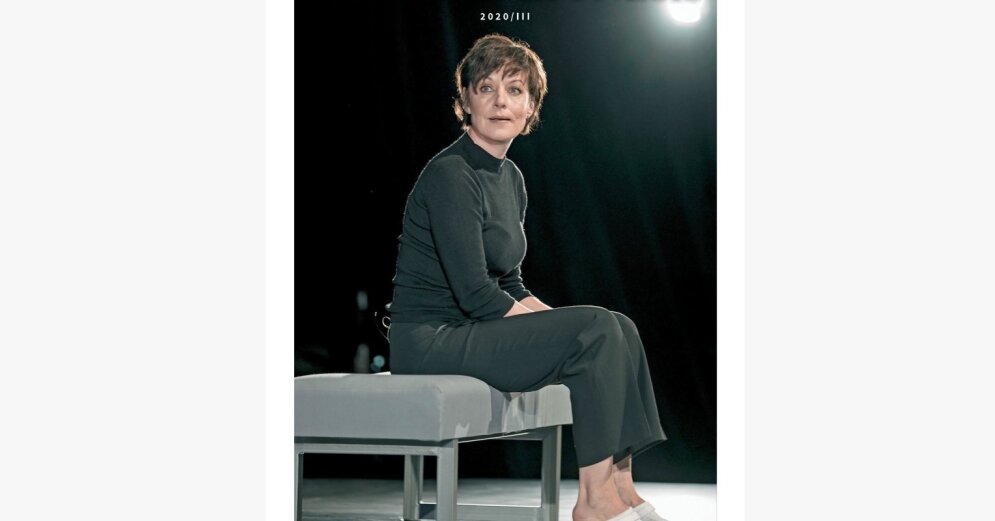At the end of October, the latest issue of the magazine “Teātra Vēstnesis” was published, offering an analysis of current events and reviews in the performing arts. The theme of the autumn issue of the magazine is “Art and Interdisciplinarity”.
–
Content will continue after the ad
Advertising
–
In the “Process” section of the magazine – the latest works of this season in all Latvian theaters, paying attention to the strategy of a particular theater during a pandemic. Ieva Rodiņa analyzes what is happening in her centenary Daile, Maija Svarinska looks at the performance of the National Theater, Edīte Tišheizere focuses on non-governmental or public theater, Atis Rozentāls – on Daugavpils and Mikhail Chekhov’s Riga Russian Theater. Vēsma Lēvalde, on the other hand, writes about the Liepāja Theater, which has attracted public attention this season not only with its artistic achievements, but also with its critical financial situation due to its unclear legal status. This time, the performance of Valmiera Drama Theater is considered as two different opinions about “Younger Brother’s Summer” staged by Inese Mičule, their authors Gundega Saulīte and Ieva Struka have agreed only in the opinion that the arrival of six new actors in the repertoire performance is significant. Juta Ance Rombergs and Jevgenija Šermenova focus on two important events – the International New Theater Festival “Homo Novus” and the Valmiera Summer Theater Festival, evaluating them also in the context of the overall theater situation.
The theme of the magazine is “Art and Interdisciplinarity”, ie a theater that has blurred the boundaries of one art form and is found in the interdisciplinary territory of contemporary art. Where is the author in it all? What are the areas where the theatre’s new paths intersect? What does this mean for the actor? And finally, how to prepare young professionals for such an inter-genre fusion? In search of answers to these questions, two different “round tables” have been created. Dance critic Inta Balode talks to teachers Zani Kreicbergs and Elmars Seņkovs, who have been joined by art curator Valts Miķelsons. The conversation between the young artists Jana Jacuka, Luīze Lotte Nežberte, Ernest and Robert Wilson and Artūrs Čukurs is led by Kirils Vilhelms Ēcis. Inta Balode also writes about her experience in changing genres and functions. The culmination of the topic is a personal and exclusive interview with actress Guna Zariņa to Ieva Struka.
In the magazine’s “Interviews” section – Vilnius Wind’s conversation with director Vladislav Nastavshev about work here and in Moscow, Maija Svarinska’s conversation with the leading Riga Russian theater actress Veronika Plotnikova, Dita Jonīte’s conversation with Latvian choreographer Inga Rauding, whose work has been seen by many in theaters.
Silvija Geikina writes about the Youth Theater actress Anda Zaits in the section “Legends”, and Gundega Saulīte writes about the Daile Theater actor Artūrs Dimiters.
The “Portrait” section started in the last issue is continued by the portrait of Maria Linarte written by Atis Rozentāls.
In the section “Young”, the student of the Latvian Academy of Culture Didzis Ruicēns discusses the festival “Autumn of the Patriarch” curated, created and evaluated by the students of the Latvian Academy of Culture. But the exhibition of scenography works of Latvian Art School students in the Theater Museum comments and our favorite work is highlighted by our scenography legend, the teacher of the creators of the space, Andris Freibergs.
In the “Baltic Experience” section, Yevgeny Shermenov analyzes Lukash Tvarkowski’s multidimensional performance “Republic” at the Lithuanian National Drama Theater, drawing attention to this important event, which is also a collaboration with Munich’s “Kammerspiele”.
In the section “Translation” – Guna Zeltiņa’s commentary on the monograph “Rediscovering Stanislavsky.” Shevtsova, Maria. Rediscovering Stanislavsky. Cambridge University Press: 2020), as well as an excerpt from this book.
The magazine “Teātra Vēstnesis”, published with the support of the State Culture Capital Foundation (VKKF), is the oldest press publication dedicated to the cultural sector in independent Latvia.
–


